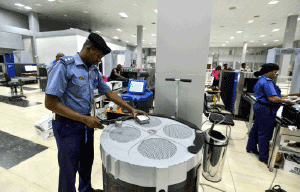Editor, Politics/Features, EMEKA ALEX DURU, writes on the Aviation Ministry debt controversy and its likely impact on the development of the sector
There are indi
AVSEC staff testing of the newly acquired detector machine
cations that controversies and high-wired politics that led to the removal of the former Aviation Minister, Stella Oduah, may not be over yet in the ministry. Signs of existing uncertainties in the ministry became obvious when the House Committee on Aviation claimed that a huge debt put at N174.6 billion has been incurred by the Ministry, describing it as unsustainable.
The committee, led by Nkiru Onyejeocha (its chairperson), expressed dissatisfaction at the development when it went for its oversight function at the ministry and its agencies, recently.
Onyejeocha also reportedly denied knowledge of the aviation masterplan which has guided the reform witnessed so far in the sector.
She said: “I wish to state here that the committee frowns at such debt profile because we know that monies have been appropriated for most of the projects that you have been doing in aviation. It is scary to have a debt profile of N174 billion in the Ministry of Aviation.”
The committee members had expressed concern that most of the projects done were to re-model the airport terminals and not to provide equipment that would improve the safety of flights in the country.
Since the remarks by the lawmakers, there have been reactions from stakeholders in the industry. For example, the Supervising Minister of Aviation and Minister of State for Commerce and Trade, Samuel Ortom, has stated that the alleged debts were not incurred by his administration since it has not awarded any contract and does not intend to award any until it has addressed the alleged huge debts.
But Association of Aviation Stakeholders (AAS) has disagreed with Onyejeocha, accusing her of playing bad politics with the issue. According to AAS National President, Abubakar Dan Maikasuwa, she cannot claim ignorance of the $500 million Chinese-Exim Bank loan for the aviation sector and other infrastructural projects of the federal government.
TheNiche gathered from ministry officials that the debts in question refer to the loan of $500 million from China Exim Bank and the Eurobond loan of $100 million scheduled to be liquidated from the proposed Airport Development Levy of $10 (international passengers) and N1,000 (local passengers), with a five-year projected income.
According to the officials, funding sources for the reform in the aviation sector include Bilateral Air Services Agreement (BASA) funds, appropriations, internally generated revenue (IGR) and other sources of funding such as proposed Airport Development Levy and Security Surcharge.
For the BASA funds, it was learnt that there was a presidential approval for Presidential Priority Projects in Aviation, which conveyed approval for utilisation of the sum of 60 million in the BASA Fund and was submitted to the National Assembly for appropriation to be supplemented by a further N14.6 billion from the IGR of Federal Airport Authority of Nigeria (FAAN).
Thus, the Senate Committee on Aviation in a letter to the Minister of Aviation approved the utilisation of the $60 million from BASA funds. The letter, TheNiche was told, was signed by the chairmen of Senate and House of Representatives committees on Aviation.
The Senate and House of Representatives Joint Committee on Aviation, in another letter written to Oduah, conveyed its approval/appropriation of utilisation of the BASA funds of N25 billion for the execution of the ministry’s projects.
In the same vein, the State House, Abuja, through a letter to the Coordinating Minister of the Economy and Minister of Finance, Ngozi Okonjo-Iweala, conveyed approval for the procurement of critical infrastructure such as perimeter fencing, airfield lighting, water hydrant systems and fire-fighting equipment. The letter signed by the Chief of Staff to the President stated: “Five hundred million dollars earmarked for the aviation sector in the negotiated loan from China EXIM Bank should be used for the construction of four new terminal buildings at Lagos, Abuja, Kano and Port Harcourt airports. Of the current balance of N175 billion Power and Aviation Intervention Fund (PAIF), N75 billion should be allocated to the aviation sector. Additional funding of N25 billion from BASA fund to be made available for urgent infrastructure upgrades (BASA Fund currently has accrued revenue of about N30 billion).”
For appropriation, it was further gathered that the Ministry of Aviation approved and awarded a total of 15 projects in Phase I of the airport re-modelling and facility development in 2011, amounting to N12,808,150,598.30.
Also, the ministry approved and awarded 91 contracts for Phase II and additional consultancy projects in 2011 totalling N97, 668,167,822.11.
To complement the goals of the first and second phases of the projects, the ministry secured the sum of N43,149,077,670.50 in the 2013 Appropriation to implement the Phase III approved by the Bureau of Public Procurement (BPP) after submission by the MTB.
The funding was to be augmented from the approved BASA fund amounting to N25 billion, of which the sum of N14.3 billion was already available. The project funding was expected to further be augmented with funds allocated to airport development projects in the IGR appropriation from its agencies in 2013, and subsequently yearly for all projects.
While the loan controversy lingers, concerned Nigerians have warned on any development that could take the nation to its dark days of aviation history. Until the last two years, for instance, it had become apparent that the waning confidence Nigerians had had on the aviation sector had dipped further, especially following some air mishaps.
It was not that Nigerians had entirely been enthusiastic about the sector. There had, in fact, been occasions when concerned analysts had referred to airplanes in the country as flying coffins.
Thus, when Oduah was appointed minister and assigned aviation portfolio, the initial reaction by critics was that she lacked the capacity to reposition the sector that had virtually been lying comatose.
But apparently conscious of the pessimism trailing her appointment, she had declared that her focus was to reposition the industry as a major contributor to the nation’s Gross Domestic Product (GDP).
She followed up her pledge in repackaging the nation’s airports. At the Murtala Mohammed Airport, Lagos, for instance, apart from the General Aviation Terminal (GAT) which has witnessed huge infrastructure uplift, there has been work at the international wing. Before her removal, 22 airports across the country had undergone facelift that changed travel experience for most passengers.
Dr. John Ighile, an aviation consultant, noted that while the House of Representatives Committee and the Aviation Ministry sort out the debt issue, efforts should be made to ensure that it does not pull back the gains recorded on the sector.
“This is not an issue of politics; it is about aviation that has universal standards. My advice is that those responsible for the sector should not pull back the gains recorded, in whatever guise,” he stressed.












